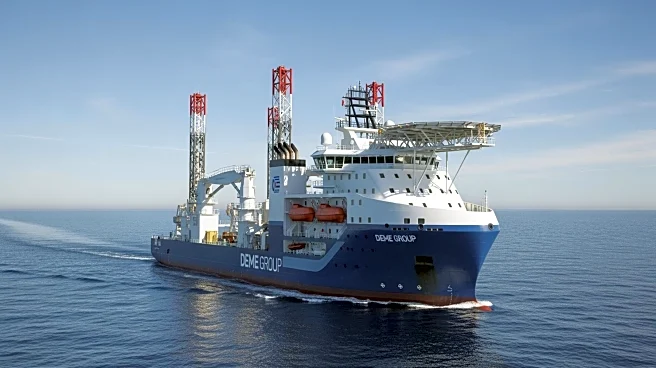What's Happening?
Belgium's DEME Group has taken delivery of the Norse Wind, a new wind turbine installation vessel equipped with hybrid power technology. The vessel, built by China's CIMC Raffles Shipyard, is designed for large offshore wind projects and features a 3,200-tonne
crane capable of installing turbines with rotor diameters over 300 meters. The Norse Wind utilizes a direct-current power system, allowing it to operate on batteries and reduce emissions. This technological advancement positions DEME as a major player in the offshore wind sector, enhancing its capabilities to deliver large and complex projects.
Why It's Important?
The delivery of the Norse Wind marks a significant step in DEME's expansion in the offshore wind industry, reflecting the growing demand for sustainable energy solutions. The vessel's hybrid power system represents a technological advancement that reduces emissions and enhances operational efficiency. As the global focus on renewable energy intensifies, DEME's investment in cutting-edge technology positions the company to capitalize on the increasing demand for offshore wind installations. The vessel's capabilities to handle large projects contribute to the industry's efforts to transition to cleaner energy sources and reduce carbon footprints.
What's Next?
DEME's Norse Wind is already contracted for several major offshore wind projects, with its first assignment at the Nordseecluster B offshore wind farm in Germany. The vessel's advanced capabilities are expected to facilitate the installation of turbines and inter-array cables, contributing to the project's total capacity of up to 1.6 GW. As DEME continues to expand its fleet with the upcoming delivery of the sister ship, Norse Energi, the company is poised to strengthen its position in the offshore wind sector. The focus on sustainable energy solutions is likely to drive further investments and technological advancements in the industry.
Beyond the Headlines
The introduction of hybrid-powered vessels like the Norse Wind highlights the broader shift towards sustainable practices in the maritime and energy sectors. The vessel's ability to operate in extreme weather conditions and reduce emissions reflects the industry's commitment to environmental stewardship. As companies like DEME invest in innovative technologies, the offshore wind sector is likely to experience increased efficiency and reduced environmental impact, contributing to global efforts to combat climate change.
















